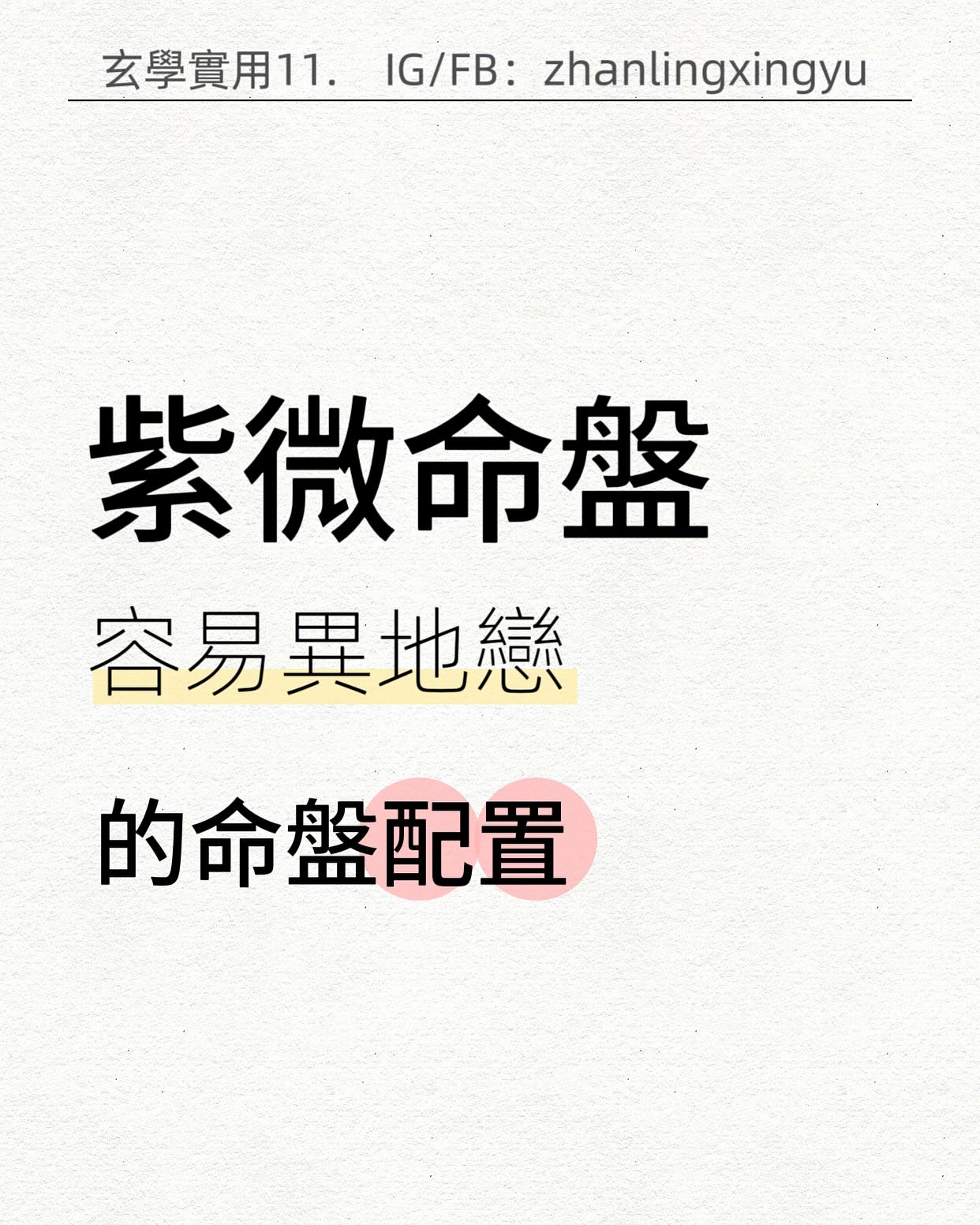
Easily Prone to Long-Distance Relationships in Zi Wei Dou Shu Charts
Based on specific configurations in the Zi Wei Dou Shu chart, certain combinations may indicate a higher likelihood of long-distance relationships. These factors involve the interplay of the Spouse Palace, Career Palace, Sibling Palace, and the influence of stars such as Di Jie (地劫) and Tian Ma (天马). Below is an analysis of the key indicators:
Configurations Prone to Long-Distance Relationships
1. Spouse Palace with Di Jie or Tian Ma
Analysis:
- Di Jie represents emptiness or detachment. When present in the Spouse Palace, it suggests that the relationship is easily influenced by external circumstances such as distance or time apart.
- Tian Ma is a star of movement and change, indicating that the spouse may frequently travel or relocate due to work or other commitments.
- The combination of Di Jie and Tian Ma in the Spouse Palace intensifies the likelihood of separation due to constant changes.
Manifestations:
- The partner may frequently travel for work or reside in a different city, leading to a situation where time together is limited.
- Relationships may experience insecurity due to physical separation, although strong communication can help maintain the bond.
2. Hong Luan or Tian Xi with Di Jie Nearby
Analysis:
- Hong Luan and Tian Xi symbolize romance and marriage affinity. If either is paired with Di Jie, the romance may face obstacles, such as distance or external interferences, making it harder to sustain.
- During the relationship or courtship phase, long-distance factors—such as work, study, or family obligations—are often significant challenges.
Manifestations:
- Relationships often start as online or long-distance relationships. Physical separation can make it harder for the connection to grow.
- If Hong Luan or Tian Xi in the annual chart is further affected by Di Jie, it may indicate periods of separation or emotional distance in marriage.
3. Career Palace with Di Jie or Tian Ma
Analysis:
- The Career Palace represents work and professional development. The presence of Di Jie or Tian Ma suggests instability or frequent relocations due to work, affecting the ability to maintain a stable relationship.
- Di Jie implies challenges in maintaining consistency in career, while Tian Ma indicates frequent movement for career purposes.
Manifestations:
- The spouse or the individual may be involved in professions requiring constant travel or relocation, such as trade, aviation, or logistics.
- The relationship may face difficulties as work commitments demand physical separation.
4. Sibling Palace with Di Jie
Analysis:
- The Sibling Palace, adjacent to the Spouse Palace, indirectly influences the stability of relationships. Di Jie in the Sibling Palace often indicates estrangement or a lack of support from family, which can extend to emotional detachment in relationships.
- This configuration often points to a lifestyle where the individual is away from family, increasing the likelihood of long-distance relationships.
Manifestations:
- The individual may have left home for study or work at an early age, resulting in a pattern of long-term separation from close ones.
- If the Spouse Palace or Travel Palace is similarly affected, the probability of long-distance relationships is significantly higher.
5. Female Charts: Di Jie Near the Sun or in its Opposing Palace
Analysis:
- In female charts, Tai Yang (Sun) represents the husband or significant male figure. If Di Jie is near the Sun, it suggests that the husband may lead a life marked by frequent travel or relocation, making it difficult for him to stay by the native's side.
- If Di Jie is in the opposing palace of the Sun, external factors may cause the relationship to endure long-term separation.
Manifestations:
- The spouse may have a busy career or a profession requiring frequent travel.
- The relationship requires trust and communication to overcome challenges created by physical distance.
6. Male Charts: Di Jie Near the Moon or in its Opposing Palace
Analysis:
- In male charts, Tai Yin (Moon) represents the wife or significant female figure. When Di Jie is near the Moon, it indicates that the wife may frequently travel or reside in a different location, often due to career or family obligations.
- If Di Jie is in the opposing palace, it suggests that the wife’s lifestyle or circumstances make it challenging for the couple to stay together consistently.
Manifestations:
- The spouse may work in fields that require mobility, such as education, healthcare, or cross-regional businesses.
- The individual may struggle to maintain the initiative in the relationship, especially when faced with long-distance challenges.
Summary and Recommendations
Charts prone to long-distance relationships often feature stars like Di Jie and Tian Ma, which bring volatility and separation to the Spouse Palace, Career Palace, and Travel Palace. These configurations suggest the following key points:
- Spouse Palace and Tian Ma/Di Jie combinations indicate relationships with significant physical distance.
- Career Palace and Travel Palace interactions suggest frequent relocations or travel due to work.
- Hong Luan or Tian Xi with Di Jie nearby indicates romantic connections facing physical separation during development.
Suggestions:
- Strengthen trust and communication in relationships to address insecurities caused by distance.
- Be mindful of your lifestyle and career patterns when choosing a partner, ensuring compatibility in your future paths.
- Use Zi Wei Dou Shu insights to recognize and mitigate potential challenges in relationships caused by external factors.
This interpretation combines practical recommendations and an understanding of key astrological configurations to provide a comprehensive guide for individuals prone to long-distance relationships.

